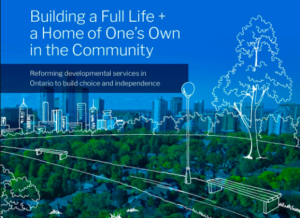Australia’s National Disability Insurance Scheme (NDIS) is often referenced as a leading example of disability service reform, and there is much to learn from the country’s experience. However, the NDIS has been plagued by a number of issues – especially for people who have an intellectual disability – and it is crucial that we learn from Australia’s mistakes. READ THE … Read More
The Importance of Our Autonomy
Volunteering with various organizations to flame the social change movement, Joyce Balaz has been advocating for persons living with disabilities to have equitable access to the supports necessary to live an everyday ordinary life in the community. Joyce holds leadership roles in the Individualized Funding Coalition for Ontario, Ontario Independent Facilitation Network, Family Network Thames Valley and Family Alliance Ontario. For me, … Read More
Position: The Right to Live in the Community
People First of Canada (PFC) believes that no person, regardless of disability, should live in any kind of situation that promotes or practices congregation, segregation, or isolation. It is our belief that all people, regardless of disability, can live within their community, with appropriate supports. We also believe that people should exercise their right to voice and choice in determining … Read More
Crystalizing the Case for Deinstitutionalization: COVID-19 and the Experiences of Persons with Disabilities
Crystalizing the Case for Deinstitutionalization: Covid 19 and the Experiences of Persons with Disabilities[i] From the London School of Economics and Political Science, UK (LSE) May 2021 Martin Knapp, Eva Cyhlarova, Adelina Comas-Herrera, Klara Lorenz-Dant FORWARD Professor Gerard Quinn United Nations Special Rapporteur on the Rights of Persons with Disabilities Chair, Leeds University Centre for Disability Studies, UK Affiliated Chair, … Read More
Bill 218: The Death of Memory
It was on or about May 20 that the Canadian Armed Forces submitted what has to be described as a whistleblower report to the federal government as to the conditions of the long-term care homes in Ontario. In part, this report detailed cases where residents had not been fed or bathed and many were literally crying out for help. Cockroach … Read More
Aging in Place – We Have a Way to Go!
Community Living Upper Ottawa Valley is committed to sharing practices and processes that relate to success and enhancing people’s quality of life. However, we have a way to go before we can celebrate success in supporting seniors in the most dignified and respectful manner. We support some people who are in their 50s, 60s and 70s that live in long-term … Read More
Building a Full Life + a Home of One’s Own in the Community: Report Now Available
Building a Full Life + a Home of One’s Own in the Community is a new report from Community Living Ontario that offers recommendations on individualized funding, housing, and community inclusion for people who have an intellectual disability. The report provides detailed guidance and insights, and will hopefully serve as a platform for meaningful discussion as the province moves forward … Read More
Why are Persons with Disabilities Being Placed in Long-term Facilities?
As an active member in the Community Living movement for decades, I have served on local, provincial and national boards. In these roles, I championed families in an association that sometimes forgot that families gave birth to the movement while almost exclusively focusing on the needs of individuals with intellectual disabilities. Over the years, however, as my parents aged and … Read More
Aging-in-Place for All
The statement that most caught my attention in the recently released Ontario COVID-19 Long-term Care Commission Report reads: The average age of long-term care residents . . . is 84. The Commission heard that residents typically enter a long-term care home in the last two years of their life, and that approximately 22,000 long-term care residents die every year. (p. 41) … Read More
Long-Term Care Reports – Will the Right Thing Be Done?
Last week (end of April 2021), two reports were released that should influence the way government fixes its dysfunctional long-term care (LTC) system. The Office of the Auditor General of Ontario and Ontario’s Long-Term Care COVID-19 Commission laid out their conclusions and recommendations to fix the broken system that severely affected those citizens and staff who rely on the 625 … Read More

